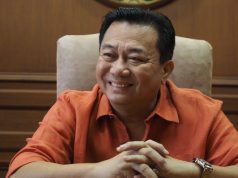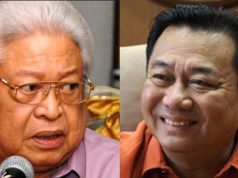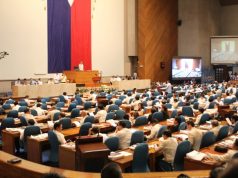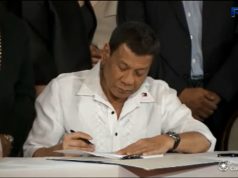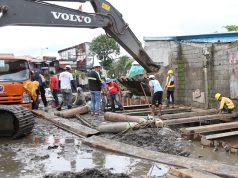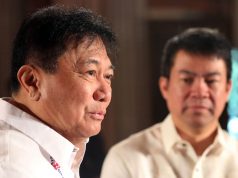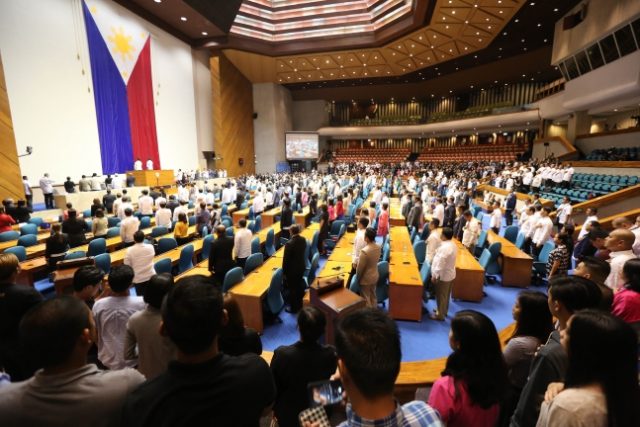
MANILA, Philippines – The 2018 budget bill being scrutinized at the House of Representatives and certified as urgent by Malacañang will be put to a nominal vote for third and final reading on or before September 21.
Plenary deliberation of the budget pushed through Tuesday despite the suspension of work in all government officers in Metro Manila due to the inclement weather.
The second national budget crafted under the Duterte administration, the 2018 budget represents 21.6% of the projected gross domestic product (GDP) for next year and is 12.4% higher than the 2017 budget which is P3.35 trillion.
While giving billions to some government departments, the House of Representatives handed three agencies drastic cuts that could render them defunct in 2018.
The Commission on Human Rights (CHR), National Commission on Indigenous Peoples (NCIP) and the Energy Regulatory Commission (ERC) were given only P1,000 appropriations each on Tuesday, September 12, as the House approved on second reading the proposed P3.76 trillion budget for next year under House Bill 6125.
The approval, done through viva voce, came after seven days of plenary deliberation.
The original proposed budget for the CHR was P649.48 million; P1.13 billion for NCIP; and P350.9 million for ERC.
The P1,000 budget is not yet final, though, as the 2018 budget bill will still go to the Senate for deliberation.
Earlier Speaker Pantaleon Alvarez voiced out his opposition to the CHR budget, saying it was turning a blind eye to violations committed against law enforcers. The NCIP budget cut was proposed because of the agency’s failure to address the concerns of the lumad communities, while the ERC remained mired in corruption allegations and anomalies, and lawmakers said it does not deserve a budget.
After the approval on second reading, the House created a small committee headed by appropriations committee chairperson Rep. Karlo Nograles to receive the individual amendments of lawmakers. They have until Friday to submit their amendments.
The Makabayan bloc of lawmakers – composed of Reps. Carlos Zarate, Antonio Tinio, France Castro, Emmi de Jesus, Arlene Brosas, Ariel Casilao and Sarah Elago – voted against the proposed budget.
During interpellation on the general principles and provisions of the national budget, Zarate questioned the deviation of the availability of appropriations from a two-year period to one year.
According to the Department of Budget and Management (DBM) the imposition of a one-year availability of appropriation aims to pressure and discipline agencies to spend their funds efficiently.
Zarate said he does not see the logic of such use-it-or-lose-it policy, stating that it would have dire consequences particularly in addressing the housing backlog and the MOOE (maintenance and other operating expenses) cutbacks in public hospitals while increasing the drug war budget.
“Bakit paparusahan ang mga ahensyang dapat magbigay ng batayang serbisyo samantalang tataasan ang hindi makamamayang pondo kagaya ng Oplan Double Barrel,” he said.
De Jesus and Brosas said “there is nothing commendable in convening this chamber amid heavy rains and flooding only to railroad on second reading a national budget that will swamp Filipinos with more economic burden, ensure continuation of bloodbath against poor, and inundate communities with mega-infrastructure projects.”
Departments/ Agencies and their Budget:
(Source: National Expenditure Program for 2018)
*Department of Education: 691.1 billion
(Major projects and programs: Construction of 47,000 classrooms; repair and rehabilitation of 18,000 classrooms; procurement of 84,781 school seats; creation of 81,100 teaching positions)
*Department of Public Works and Highways: 630.24 billion
(Major projects and programs: As part of the Build, Build, Build program, will construct P49.3 billion worth of bypasses and diversion roads; P15 billion to pave national arterial and secondary roads; P5.4 billion for flyovers, interchanges and underpasses; P55.4 billion to construct missing links across the nation)
*Department of Interior and Local Government: 170.73 billion
(Major program and projects: PNP law enforcement operations, especially to combat illegal drugs; hiring of 10,000 new Police Officer !; funding of Oplan Double Barrel Reloaded)
*Department of National Defense: 144.67 billion
(Major programs and projects: Armed Forces modernization)
*Department of Social Welfare and Development: 137.55 billion
(Major projects and programs: Continue benefit to 4.4 million existing members of the 4Ps; livelihood assistance; health services)
*Department of Health: 104.71 billion
(Major projects and programs: Facilities improvement of 353 hospitals; construction of 1,497
Barangay Health Stations (BHS); building of 177 new Rural Health
Units (RHUs); completion and equipping of 3,320 RHUs and 28,188 barangay health units; PhilHealth funding for 15.4 million families and 5.4 million senior citizens)
*Department of Transportation: 61.05 billion
(Major projects and programs: Bus rapid transit for Metro Manila and Cebu; aviation infrastructure program; building new airports and modernizing existing ones; modernization of ports and harbours; construction of rail transport)
* Department of Agriculture and attached agencies: 51.83 billion
(Major programs and projects: Rice, corn, crops, livestock development; farm to market road projects; irrigation projects)
*Autonomous Region in Muslim Mindanao: 32.3 billion
*Department of Environment and Natural Resources: 21.57 billion
(Major programs and projects: National greening program; hiring of forest protection officers; forest rehabilitation; mapping and assessment of ecological resources)
*Department Science and Technology and attached agencies: 20.97 billion
(Major programs and projects: Scholarships for some 36,977 students; financial grants to science and technology programs and projects; assistance to MSMEs; research)
*Department of Finance and attached agencies: 17.97 billion
(Major programs and projects: Revenue strengthening programs)
*Department of Justice and attached agencies: 17.27 billion
(Major programs and projects: Legal services; hiring of lawyers)
*Department of Agrarian Reform: 9.93 billion
(Major programs and projects: Land tenure security program; agrarian justice delivery)
*Department of Information and Communications and attached agencies: 6.87 billion
(Major programs and projects: ICT systems and infrastructure development program; free internet wi-fi connectivity in public places; national broadband plan)
*Department of Labor and Employment: 6.85 billion
(Major projects and programs: separate P7 billion budget for the Technical Education and Skills Development Authority for skills enhancement and retooling programs)
*Department of Tourism and attached agencies: 3.33 billion
(Major programs and projects: Parks development; tourism promotion)
*Department of Energy: 2.65 billion
(Major projects and programs: Nationwide household electrification and sitio electrification program)
The Office of the President will get P6 billion, while the Office of the Vice President will get P443.9 million.
The Senate will get P4.2 billion, while the House of Representatives will get P9.6 billion.
The 2018 budget will have a contingent fund of P13 billion. As for the calamity fund, the 2018 budget proposed an amount of P25.5 billion, or P10 billion higher than the 2017 budget.
Allocation to Local Government Units (ALGU) will get P78.23 billion. This is broken down into the following: (Metropolitan Manila Development Authority, P3.5 billion; Special Shares of LGUs in the proceeds of national taxes, P23.11 billion; Barangay officials death benefits fund, P50 million; Local government support fund, P51.27 billion; and, Special shares of LGUs in the proceeds of fire code fees, P250 million).
The Budgetary Support to Government Corporations will get P170.1 billion. This items comes in three types: Subsidy, equity, and net lending.
President Rodrigo Duterte had certified the proposed P3.767 trillion budget for 2018 as an urgent measure, urging Congress to expedite its enactment.
In a letter to Speaker Pantaleon Alvarez, the President said, “Pursuant to the provisions of Article VI, Section 28 (2) of the 1987 Constitution, I hereby certify the necessity of the immediate enactment of House Bill 6215, titled An Act appropriating funds for the operation of government of the Republic of the Philippines from January 1 to December 31, 2018.”
The President said the budget was needed “in order to address the need to maintain continuous government operation following the end of the current fiscal year, to expedite the funding of various programs, projects and activities for fiscal year 2018, and to ensure budgetary preparedness that will enable the government to effectively perform its Constitutional mandate.”
The House of Representatives is currently conducting floor deliberations of the proposed budget and is expected to approve it on second reading late Tuesday.
The certification of a measure as urgent allows the House to approve a bill on second and third reading on the same day, without waiting for the three-day interval.




